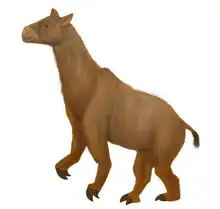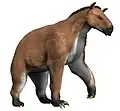| Borissiakia Temporal range: | |
|---|---|
.jpg.webp) | |
 | |
| Mounted skeleton (top) and life restoration (bottom) | |
| Scientific classification | |
| Domain: | Eukaryota |
| Kingdom: | Animalia |
| Phylum: | Chordata |
| Class: | Mammalia |
| Order: | Perissodactyla |
| Family: | †Chalicotheriidae |
| Subfamily: | †Schizotheriinae |
| Genus: | †Borissiakia Butler, 1965 |
| Type species | |
| †Borissiakia betpakdalensis originally Moropus betpakdalensis Flerov, 1938 | |
Borissiakia is an extinct genus of chalicothere, a group of herbivorous, odd-toed ungulate (perissodactyl) mammals, that lived during the late Oligocene in Kazakhstan. They had claws that were likely used in a hook-like manner to pull down branches, suggesting they lived as bipedal browsers.[1]
References
- ↑ Coombs, Margery C. (13 Feb 2009). "The chalicothere Metaschizotherium bavaricum (Perissodactyla, Chalicotheriidae, Schizotheriinae) from the Miocene (MN5) Lagerstatte of Sandelzhausen (Germany): description, comparison, and paleoecological significance" (PDF). Paläontologische Zeitschrift. Springer Berlin / Heidelberg. 83 (1): 85–129. doi:10.1007/s12542-009-0004-x. S2CID 140194075. Archived from the original (PDF) on July 24, 2018.
Sources
- Classification of Mammals by Malcolm C. McKenna and Susan K. Bell
This article is issued from Wikipedia. The text is licensed under Creative Commons - Attribution - Sharealike. Additional terms may apply for the media files.
